La storia di Peter Pan è stata portata sullo schermo in molte versioni diverse ma quella del 2003 è particolarmente interessante. Produzione australiana diretta da P.J. Hogan, con Jeremy Sumpter nel ruolo di Pan e Jason Isaacs in quello duplice di Uncino/Mr. Darling.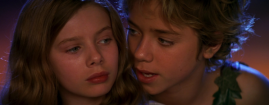
La prima a considerare la tensione sessuale tra Wendy e Peter (non si sono mai dati un “vero bacio” se non in questo film) e soprattutto a fare una malinconica riflessione sull’eterno ragazzino. E’ proprio Uncino a sottolineare durante il duello finale che Wendy infine abbia scelto di crescere piuttosto che stare con Peter, figura maschile irrimediabilmente incompleta.
Essere Peter Pan per un giorno è il sogno di ogni bambino e sicuramente di molti adulti ma cosa significa realmente esserlo per la vita? Non voler crescere non è un atto di fantasiosa ribellione ma bensì di estrema codardia e per la prima volta Peter Pan appare sfumato da una nota melanconica. Non ha avuto il coraggio di diventare grande e per questo ha scelto di fuggire.
THE SOCIAL NETWORK – Or How Did We Become one
[PREMISE: All considerations made into this post were inspired by a conference held by Professor Luca Malavasi in Milan, July 2015. The movies and books quoted were part of his lecture as well]
“You think you know me, don’t you?”
“I’ve read enough”
“You know how much I’ve read about you? Nothing.”
[The Social Network]
They say you could never make a movie about a writer because the best you could do is show him writing. And yet this is a movie about a computer programmer who uses a language that is even more intelligible to most people[1]. I guess it took David Fincher and the excellent writing abilities of Aaron Sorkin to make such a splendid film that spans over computer programming, web strategy and finance.
We all know the story of Mark Zuckerberg, the antisocial nerd who realized that what people wanted most was a glimpse of someone else’s life and gave them that. He created a network that has changed forever the world of social media, triggering a ripple effect that will probably incrementally evolve.
As a matter of fact Sorkin’s dialogues are built as a network, with complexity levels that are a reflection of the same system upon which relationships are built on Facebook. How many among your FB friends do you actually know or spend time with? Most of them are people you may have crossed paths with once in your life or people you’ve actually never even met. There are many other movies that are built like a reticular tissue, from Matrix to the most recent Inception.
I’m not gonna talk about the movie itself and what it means in terms of loyalty to a friend, the conflicts that aroused when people realized the potential value of Facebook or the profile of this young billionaire. I couldn’t do that even if I wanted, let’s not forget that The Social Network still remains a Hollywood movie and therefore Zuckerberg character has been accentuated from the person he probably is in real life. Although there was definitely a mimetic intention during casting: Jesse Eisenberg resembles Mark Zuckerberg as much as Justin Timberlake nailed the role of Sean Parker.
I actually wanna talk about the role of social media and how they’ve affected our way of living and perceiving ourselves, slowly turning us into our own social networks. I guess we could say that Facebook has pioneered this incredible revolution, becoming the third most clicked website, after Google and Youtube, with almost 900.000.000[2] visitors per month. Its population has increased dramatically over the course of a decade, having reached 1.06 billion by the end of 2012.
Many other social media[3] had preceded and many followed its path and became as useful and popular such as Twitter (which has a much simpler and private interface), Linkedin (for professional purposes) and YouTube (video sharing device), that actually is a lot more relevant that people would think.
Now what we ought to ask ourselves is the following: did we start relying so much on those social networks to fulfill some specific needs or did they slowly model our way of thinking and perceiving life that ultimately we have become social networks ourselves?
In this very interesting conference held by Professor Malavasi, several distinct features of our “social media generation” were brought up. Three of them were actually quoted from Henry Jenkins[4], an estimated Professor, writer of Convergence Culture: Where Old and New Media Collide[5]. (I highly suggest you read this book)
- THE NEED FOR SELF-PORTRAIT
More commonly known as “selfies”, these silly pictures taken with one arm stretched out and nothing but your gigantic face to fill in the screen have become so popular that even President Obama took some. Dr. Terri Apter[6], psychology lecturer at Cambridge University, says it’s “A kind of self definition. […] We all like the idea of being sort of in control of our image and getting attention, being noticed, being part of the culture”. But mostly, the concept of self-portraying implies that you’re somehow able to control your image and present yourself, as you’d like to be perceived by others
- CONVERGENCE
Defined by Jenkins as the “flow of content across multiple media platforms, the cooperation between multiple media industries, and the migratory behavior of media audiences who would go almost anywhere in search of the kinds of entertainment experiences they wanted” - PARTICIPATORY CULTURE
According to Jenkins “In this emerging media system, what might traditionally be understood as media producers and consumers are transformed into participants who are expected to interact with each other according to a new set of rules which none of us fully understands” - COLLECTIVE INTELLIGENCE
This participatory culture inevitably generates an intelligence without boundaries that relies on inputs given by billion of users
For some reason I was by far the youngest person sitting through that conference and once all these variables were explained many older people commented, saying that all this sounded really bad and dangerous (some of them had already walked out during the screening of The Social Network because the dialogues were too hard to follow. In their defense we were also watching it in English with Italian subs. Try doing that with a Sorkin screenplay and let me know how it works out.) We obviously talked about the consequences that this new “social media society” has on the individual. And not all of them were bad…
FEAR THE CHANGE!
- Social etiquettes and routines don’t exist anymore
- Medias have lost their specificity
- People have lost their identities
The paradigm of modern society expects a state of constant activity and therefore someone to direct this activity that is not human, that simply never needs to rest. If there’s someone watching, it means that someone else is providing content to watch and share. Therefore social etiquettes have lost their value: it’s never too late to call or shame in being online at 4 am. And after all if you can’t sleep, why don’t tell it to the rest of the world?
About the deprivation of sleep, a very cool book was mentioned in class. Written by Jonathan Crary called “24/7: Late Capitalism and the Ends of Sleep”[7] that talks about the awful consequences of the expanding non-stop processes of twenty-first century capitalism; having a market that operates literally 24/7 pushes us into being in constant activity. And this applies to us not only as consumers but especially as media consumers or better yet, relating to Jenkins definition of Participatory Culture, as participants.
“Maybe It was all inevitable. An unavoidable collision between mankind and technology.
The internet was meant to make the world a smaller place.
But it actually feels smaller without it”
[Transcendence]
As mentioned earlier in this post, the relationship with our own biography has dramatically changed in the last decade and having the need to post everything we do means that we’re evaluating our bio on a quantitative basis rather than a qualitative one. How many likes did I get? How many views will my video receive? How many followers on Instagram?
Now the real question is: are we the same people we put out there on Facebook? Aren’t we just projecting a better version of ourselves? Or at least the version of ourselves we’d like (and need) other people to think we are.
Our virtual identities are not we. They just look like us.
This induces a process called depersonalization, defined by the American Psychiatric Association[8] as “alteration in the perception or experience of the self so that one feels detached from and as if one is an outside observer of one’s mental processes or body”
Of course the Film Industry has grasped this major change in society and produced several movies that take this matter into consideration. Here are a few that were mentioned in class.
Transcendence: Johnny Depp plays a scientist trying to create an artificial intelligence by uploading his own consciousness into a program. He ultimately becomes a network himself. [Fun Fact: This is the directorial debut for Wally Pfister who had previously worked with major directors, including David Fincher, as director of photography[9]]
Lucy: A woman turns into a warrior by gradually expending her brain activity, evolving beyond human logic. Her evolution coincides inevitably with her disappearance. Once she reaches 100% power, she’s everywhere and nowhere until her own body dematerializes. Directed by Luc Besson.
Gone Girl: David Fincher is the director but this film doesn’t fall into its “post modern phase”; Professor Malavasi pointed out that it actually feels almost as a Hitchcock movie. It’s particularly interesting for its use of narration and reverse narration that enable us to relive the whole story from Amy point of view. And it’s because of her character that this movie is so strictly connected especially to the process of depersonalization. Amy describes in her diary the woman she has become for Nick but she gets to the point where it’s not even clear to herself who she really is. Ultimately, she can’t distinguish reality anymore.
Sens8: Created by Straczynski and the Wachowski brother and sister (directors of The Matrix franchise) and produced by Netflix, this is actually a TV series. 8 people around the world discover to be mentally linked and therefore can operate as one single unit capable of interchanging their respective abilities. Together they are a perfect example of collective intelligence and they operate better and more efficiently as a whole.
THERE MUST BE SOME GOOD
After exploring the not so good consequences that this revolution is triggering, let’s talk about the good that comes out of it.
First of all, I’d like once more to cite a paragraph from Jenkins “Convergence Culture”. And to think that this book was written in 2006 when we were beginning to enter convergence culture and yet it depicted a scenario that turned out to be exactly…
From the paragraph The Cultural Logic Of Media Convergence: “The American media environment is now being shaped by two seemingly contradictory trends: on the one hand, new media technologies have lowered production and distribution costs, expanded the range of available delivery channels, and enabled consumers to archive, annotate, appropriate, and recirculate media content in powerful new ways. At the same time, there has been an alarming concentration of the ownership of mainstream commercial media, with a small handful of multinational media conglomerates dominating all sectors of the entertainment industry. […] Convergence, as we can see, is both a top-down corporate-driven process and a bottom-up consumer-driven process. Corporate convergence coexists with grassroots convergence. Media companies are channels to expand revenue opportunities, broaden markets, and reinforce viewer commitments. Consumers are learning how to use these different media technologies to bring the flow of media more fully under their control and to interact with other consumers. The promises of this new media environment raise expectations of a freer flow of ideas and content.”
This “freer flow of ideas” is exactly the good that comes out of it. Grassroots productions are encouraged and there’s a streaming of new personal content (You Tube plays a bigger role than any other platform in this matter). What’s interesting though is not only the creation and diffusion of new content by the consumer/participant but especially the remaking of existing content.
As a matter of fact we find ourselves in what could be called REMIX ERA.
Through the Internet virtually everything has become available for manipulation. Movies are downloaded and re-edited, re-dubbed, taken into pieces as well as any textual content such as articles, interviews and reviews. This obviously implies the following:
- Downfall of copyright
- Loss of substance
- Loss of privacy
With these premises, it’s undoubted that editing has become the lexicon of our time. We’re all post producers and have taken the habit of editing everything, even ourselves.
I don’t know much about the music industry and I wouldn’t feel comfortable talking about it too much. But I guess this consideration could also explain the change in the role of the DJ and why he has become the show himself. Music festivals have become these huge events that are themselves a powerful platform to spread new ideas and sounds and they are built around “celebrity DJs” who become the main attraction.
Again, the consumers have become participants and they go to festivals not only to be entertained but also to be educated and discover new music. As a matter of fact I understand that some DJs have actually been criticized for “playing predictable or possibly pre-recorded sets”[10].
In return, participants transmit energy at high intensity that enables the DJ to pull such a great show. To cite Sebastian Ingrosso (whom departed from the DJ trio Swedish House Mafia in 2013): “The most important thing is now what we play, but the personality and how we interact with the crowd.”[11]
————————————————————————————————————————————————–[1] The Social Network. Roger Ebert. http://www.rogerebert.com/reviews/the-social-network-2010
[2] Top 15 Most Popular Websites. eBizMBA guide. http://www.ebizmba.com/articles/most-popular-websites
[3] The World’s Most Important Social Media Sites and Apps in 2015, Randy Milanovic, Social Media Today. http://www.socialmediatoday.com/social-networks/2015-04-13/worlds-21-most-important-social-media-sites-and-apps-2015 [4] Henry Jenkins. https://en.wikipedia.org/wiki/Henry_Jenkins
[5] Confessions of an Aca-Fan: The Official Weblog of Henry Jenkins. http://henryjenkins.org/2006/06/welcome_to_convergence_culture.html
[6] Why We Really Take Selfies: The “Terrifying” Reasons Explained. Radhika Sanghani. The Telegraph. http://www.telegraph.co.uk/women/10760753/Why-we-really-take-selfies-the-terrifying-reasons-explained.html
[7] 24/7: Late Capitalism and the Ends of Sleep. http://www.versobooks.com/books/1570-24-7
[8] American Psychiatric Association (1994) Diagnostic and Statistical Manual of Mental Disorders (4th edn) (DSM–IV). Washington DC: APA.
[9] Chat Room: Wally Pfister. http://shootonline.com/news/chat-room-wally-pfister
[10] What Is a DJ’s Role in Today’s Dance Music Festivals? Michelle Lhooq. https://thump.vice.com/en_us/article/what-is-a-djs-role-in-todays-dance-music-festivals
[11] The D.J. Maestros Axwell and Ingrosso Aim to Shake the Rafters. Joe Coscarelli. New York Times. http://www.nytimes.com/2015/04/02/arts/music/the-dj-maestros-axwell-and-ingrosso-aim-to-shake-the-rafters.html?_r=3
Pitch Perfect 2
“Aca-Wiedersehen bitches!”
IDDA’S SCORE: **
Pitch Perfect 2 (o nella sua non altrettanto efficace traduzione italiana “Voices”) torna nelle sale in questa caldissima estate libera da mondiali di calcio e competizioni sportive.
Il sequel alle divertenti avventure delle Bellas si presenta con circa la stessa trama, le stesse gag comiche e lo stesso humor.
E nonostante tutto funziona perché i mash-up delle canzoni sono semplicemente troppo belli; non importa che non siate fan del canto a cappella, questi remix sono frizzanti, divertenti e molto ben costruiti.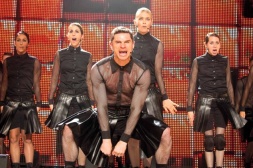
Ritroviamo le Barden Bellas più unite e affezionate che mai nonostante una tremenda figura di Ciccia Amy, di fronte a niente di meno che Barack Obama, rischi di minare l’uscita di scena dal college delle super campionesse dell’ ICCA Championship.
Per redimersi le ragazze si mettono alla prova sulla scena mondiale sfidando i temibili Das Machine, statuari e agguerriti campioni in carica direttamente dalla Germania.
Il ruolo di Beca (Anna Kendrick) in questo secondo capitolo è stato decisamente ridimensionato per lasciare spazio all’insaziabile Ciccia Amy (Rebel Wilson), l’insicura Chloe (Brittany Snow) e alcune new entry tra cui spicca sicuramente Emily (Hailee Steinfeld vista in Il Grinta dei Cohen), figlia di una famosa Bellas e impaziente di entrare a far parte del gruppo.
Molto più marginale il ruolo di Jesse (Skylar Astin) ancora fidanzato con Beca, e i suoi Ritmonelli ormai oscurati dalla fama della Bellas.
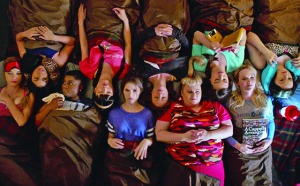 Ritroviamo anche Bumper (Adam DeVine) e seguiamo marginalmente la sua storia d’amore con Ciccia Amy; ancora una volta un po’ troppo sopra le righe, soprattutto la traversata del lago, ma che energia nel duetto “We Belong”!
Ritroviamo anche Bumper (Adam DeVine) e seguiamo marginalmente la sua storia d’amore con Ciccia Amy; ancora una volta un po’ troppo sopra le righe, soprattutto la traversata del lago, ma che energia nel duetto “We Belong”!
L’introspezione dei personaggi si fa un po’ più profonda: Beca accetta segretamente uno stage presso uno studio di registrazione e comincia a pensare al suo futuro dopo il college mentre scopriamo che Chloe continua a evitare di laurearsi proprio per paura di crescere al di fuori della Barden University.
Rincontriamo brevemente anche l’autoritaria Aubrey (Anna Camp) che aiuterà le ragazze a ritrovare la loro armonia sottoponendole a due giorni di addestramento militare canoro per poi deliziarci con un coretto di “Cups”, canzone con cui Beca aveva vinto il provino nel primo capitolo del film.
E l’immancabile duo formato da John e Gail (John Michael Higgins e Elizabeth Banks, qui anche regista) e i loro divertentissimi commenti alle performance.
Curiosità: a seguito del precedente capitolo lo stimatissimo giornalista Roger Ebert scrisse che non capiva bene a chi stessero indirizzando questo live comment. Alle televisioni? A una radio? In questo secondo capitolo si fa specifico riferimento a un  podcast…che anche loro abbiano letto la recensione di Ebert?
podcast…che anche loro abbiano letto la recensione di Ebert?
Pitch Perfect 2 piace per la buona musica intelligentemente remixata, il siparietto di Snoop Lion e il suo singolo di Natale e soprattutto per le ragazze.
La trama potrà anche essere scontata (inevitabile l’utilizzo della canzone originale per battere i Das Machine) e alcune gag troppo tirate ma complessivamente le avventure delle Bellas rappresentano un piacevole diversivo in queste caldissime serate estive.
Rush
Rush è un film emozionante e adrenalinico per quanto riguarda le corse in macchina, risparmiandoci le assurdità alla Fast and Furios, e un bello spaccato sulla Formula Uno anni ’70 da noi ben poco conosciuta.
 Ma la cosa più sorprendente, per chi Lauda l’aveva soltanto sentito nominare qualche volta dal nonno, è stata l’introspezione dei personaggi che ci ha coinvolti nel rapporto straordinario di competizione, invidia ma soprattutto rispetto che correva tra i due piloti.
Ma la cosa più sorprendente, per chi Lauda l’aveva soltanto sentito nominare qualche volta dal nonno, è stata l’introspezione dei personaggi che ci ha coinvolti nel rapporto straordinario di competizione, invidia ma soprattutto rispetto che correva tra i due piloti.
Rush è una piacevole novità perché dimostra come gli eroi non siano le automobili ma chi le guida e non può far altro che alzare il livello qualitativo del genere.
Hitch
“One dance, one look, one kiss, that’s all we get, Albert”
IDDA’S SCORE: *
I always like to re watch movies after some time, to see if I understand them better or differently as I grow up and Hitch’s DVD had been sitting on my shelf for quite a while.
I was looking for a light romantic comedy that wouldn’t require too much attention to follow and I figured what the hell…Will Smith never fails to make me smile.
And that’s pretty much all I got to say about this movie.
Good performances given by smart and funny actors who didn’t have to make that much of an effort to get into their roles.
Other than that Hitch is nothing more than an average romantic comedy you quickly forget about and would not watch again for at least a year.
Is not because it’s not good or funny, it just falls in the midst of ok movies.
One thing I noticed this time that may have tricked my teenager’s eyes a few years ago is the contrast between Hitch luxurious apartment in New York and its supposed salary as date doctor. And actually the whole matter of being a date doctor.
I don’t think such a profession could ever really exist and if it does, I doubt it would earn you an unbelievable avant-garde loft in a building with a funny doorma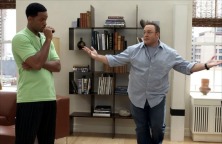 n.
n.
Nonetheless, the pair made by Smith and Kevin James delivers a couple of entertaining and well directed scenes.
In particular the one where they go from destroying Albert’s office after his disastrous intervention in the conference room, to totally cool conversation when Allegra shows up and Hitch orchestrates the whole thing behind the door.
Eva Mendes’ intervention as Sara Milas works too.
And even if it didn’t, who wouldn’t wanna watch an hour and half of Eva Mendes? She’s just gorgeous. No matter how stuck up her character might be.
Unfortunately her role as the-one-worth-making-a-fool-of-yourself-for kinda nullifies the first two acts of the movie which had actually intrigued me into finding out if Hitch would have succeeded with the hopeless Albert and out of his league Allegra.
All that action is left on its own once we get deeper into Hitchens own misfortunes while trying to hang out with Sara.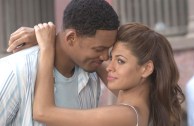
Overall Hitch is a likable movie, although it does have a few to many cliches lines, especially the final love speech.
“[…] And there’s only one person that makes me feel like I can fly… That’s you”
Come on now. I ain’t watching Gossip Girl for a reason.
Should you watch Hitch? Yes.
Why? Because it stars a good cast and it goes by fairly quickly without ever getting boring.
Will you count it among the greatest romedies of all time? I’m afraid not, but if that were the purpose I would have not watched any of Matthew McConaughey’s movies prior to Dallas Buyers Club, would I?
Me, Myself And Irene
“No art passes our conscience in the way film does,
and goes directly to our feelings,
deep down into the dark rooms of our souls”
[Ingmar Bergman]
The first time I ever saw a movie I was 2.
I watched “The Lady and The Hound”, or so my parents tell me.
Once the last credit went by on the screen, I asked them to hit rewind on our old VHS player and let me watch it again. And again, and again and again.
They say the first time people saw “L’arrivée d’un train en la gare de La Ciotat” by the Lumière brothers, they got so scared that some of them even screamed believing the train would have come out of the screen and kept running.
To them it was like magic.
I guess my reason for falling in love with it can be reconnected to that astonishment I felt watching moving images unfolding great stories I could only imagine or dream about.
Movies pose no limits to the human mind. Everything you can imagine you can shoot.
Especially nowadays technology has enabled us to recreate virtually any scenario and make it as believable as it could be.
Through movies I can travel in the past and the future, go to Alaska or take a space shuttle to Mars. I can meet Napoleon and admire the greatness of the Roman empire.
I can cry for lost loves, cherish for a soldier that comes home and watch other people lives, discovering their culture and, most of all, realize we’re not so different after all.
To me, that’s what cinema is. A journey through space and time where imagination has no boundaries and there are no social etiquettes or written rules.
Anything and everything can happen in a movie.
What else is there to say about me?
I’m a ballerina and a mermaid.
I read and I write.
I’m a huge nerd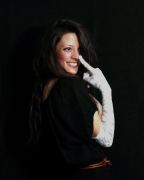 and sometimes take Elvish writing classes.
and sometimes take Elvish writing classes.
I like drinking and ordering in restaurants.
I go to the Opera but I can’t sing nor read music.
I speak English but I’m Italian.
I’m studying French but don’t know anybody in France to talk to.
I love my family because they taught me the importance of freedom.
I studied Economics but wish I knew more about philosophy and literature.
I work in the Entertainment Industry and that makes me happy.
I didn’t like the Jim Carrey movie but always exploit the title.
Because this really is me: Me, Myself and Irene.
Captain America – The Winter Soldier
The Winter Soldier trasforma il personaggio di Captain America che, per quanto più interessante di tanti altri eroi Marvel, non divenne il preferito di nessuno dopo la visione del primo film.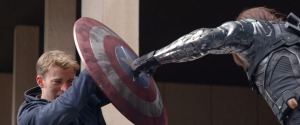
Ottima intesa con Black Widow, talmente convincente da apprezzare la loro amicizia più che sperare in un love affair.
Interessanti nuovi personaggi, il tutto condito da combattimenti corpo a corpo magistralmente .
Dunque Steve Rogers sempre genuino e puro d’animo ma al contempo disincantato, cosciente e forte come non l’avevamo ancora visto.
Troy
Quando Troy uscì al cinema, nell’ormai lontano 2004, ricordo che il giorno dopo saltammo la lezione di greco per subirci l’invettiva della mia Professoressa del liceo per l’onta fatta ad Omero.
E come darle torto.
Si può dire che la trama s’ispiri solo vagamente all’Iliade (qui Briseide uccide Agamennone e per poco anche la mia Prof), con un errore di fondo macroscopico nell’eliminare di netto gli Dei e il loro fondamentale ruolo nelle vicende di uomini che erano tutto meno che personaggi riflessivi e turbati come l’Achille interpretato da Brad Pitt.
Un esubero di soldati in CGI, set che sembrano rimasti intatti dalla Holly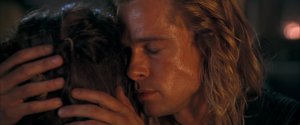 wood Classica e dialoghi fondamentalmente ridicoli.
wood Classica e dialoghi fondamentalmente ridicoli.
Eppure la scena finale di Achille-figo-vero-Brad genuflesso e morente che guarda Briseide negli occhi e sussurra “Tu mi hai dato la pace in una vita di guerra” mi fa sempre provare quell’emozione da ragazzina ed è il motivo per cui continuo ad amare Hollywood, anche quando non è altro che pacchiana e luccicante.
Maleficent
“But, as many thought whenever they saw the graceful figure soaring through the air,
it took a great hero and a terrible villain to make it all come about.
And her name was Maleficent“
IDDA’S SCORE: **
La Bella Addormentata Nel Bosco è tra le più popolari principesse Disney nonostante abbia sì e no una battuta nel celeberrimo cartone animato del 1959.
Al contrario, in Maleficent Aurora è una ragazza coraggiosa, intraprendente e dal cuore buono.
Eppure la vera protagonista della storia, che lo si voglia o meno, rimane inequivocabilmente l’alta figura tenebrosa la cui ombra proietta un paio di corna: Malefica, la quale merita decisamente di essere ai primi posti tra i migliori “cattivi” dell’universo disneyano.
Maleficent però presenta la storia sotto una luce ben diversa: una fata buona, una ragazza buona, è tradita da quello che dovrebbe essere il “vero amore”, perché spesso le persone fanno del male a coloro che amano per la brama di beni terreni e di gloria. Proprio come Stefano, che più di tutto desiderava diventare Re.
La scena più impattante del film è quella in cui, detto in minimi termini, un uomo avido deturpa una donna delle sue ali abbandonandola nel dolore e nella vergogna.
Quest’atto di crudeltà fa crescere il seme dell’odio in Malefica che sfoga il suo dolore maledicendo la figlia di Re Stefano, per poi prend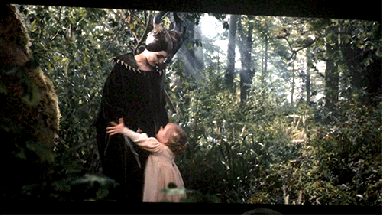 ersi cura di lei mentre le fate buone ma impacciate (forse un po’ troppo, non sono amabili in questo film) cercano di proteggerla dal suo stesso incantesimo.
ersi cura di lei mentre le fate buone ma impacciate (forse un po’ troppo, non sono amabili in questo film) cercano di proteggerla dal suo stesso incantesimo.
Passano gli anni e Malefica alleva la bambina nell’ombra, affezionandosi a lei fino ad amarla come una madre e a pentirsi della morte apparente cui l’ha condannata, tanto da mettere da parte la sete di vendetta verso Stefano e assumere, a tutti gli effetti, il ruolo di eroina.
Infatti, il suo amore per Aurora è talmente grande che avrà la forza di spezzare l’incantesimo che “nessun potere mortale” avrebbe sciolto.
In molti hanno parlato di questo film come un inno al femminismo: una donna ferita cresce con amore la bambina figlia del suo detu rpatore, la protegge dal suo stesso padre e seguaci (uomini malvagi e donne inermi) e infine la incorona Regina di un mondo fatato, in cui finalmente regna la pace.
Tuttavia credo che il tema più importante e innovativo sia legato al fatto che Malefica, nel suo ruolo di fata madrina, è il “vero amore” di Aurora.
Il film è una sorta di spin off di una favola classica come tanti se ne vedono ultimamente, con un CGI notevole ma a tratti confusionario e cambi di scena un po’ troppo repentini.
Eppure è ricco di qualcosa che nemmeno l’originale cartone animato del ’59 aveva, con tanto merito anche ad Angelina Jolie, spesso sottovalutata, e l’espressività del suo viso perfetto. Questa ricchezza sta proprio nella chiave di lettura che abbatte il dogma del tradizionale rapporto sentimentale tra uomo donna, presentando l’unico amore vero ed eterno: l’amore invincibile e potentissimo tra una madre e un figlio.
Birdman
“I’m nothing. I’m not even here”
IDDA’S SCORE: ****
Birdman si apre con un uomo seduto a gambe incrociate a mezz’aria e si chiude con lo stesso uomo che forse si è appena suicidato o forse ha spiccato il volo trasformandosi definitivamente nel suo supereroe alter ego.
Non è spiegato il perché né dell’incipit né della fine.
Addirittura nella scena iniziale l’inquadratura cambia prima di mostrarci come il personaggio torni con i piedi per terra.
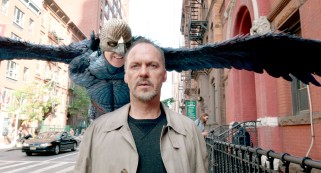 Da quel cambio di scena però, iniziamo a seguire Riggan (Michael Keaton) attraverso un vortice caleidoscopico costruito su un unico piano sequenza, magistralmente accompagnato dalla travolgente colonna sonora di Antonio Sanchez. Correndo attraverso passaggi stretti, camerini e scale a chiocciola, siamo immediatamente catapultati nel dietro le quinte di un teatro a Broadway e resi partecipi della confusione mentale che pervade il protagonista.
Da quel cambio di scena però, iniziamo a seguire Riggan (Michael Keaton) attraverso un vortice caleidoscopico costruito su un unico piano sequenza, magistralmente accompagnato dalla travolgente colonna sonora di Antonio Sanchez. Correndo attraverso passaggi stretti, camerini e scale a chiocciola, siamo immediatamente catapultati nel dietro le quinte di un teatro a Broadway e resi partecipi della confusione mentale che pervade il protagonista.
Riggan è l’ombra di un attore una volta famoso grazie al suo alter ego Birdman, un supereroe alato che di certo non si aspettava di finire nel dimenticatoio e glielo ricorda costantemente con la sua voce aggressiva e invadente.
Oltre il pallido ricordo di un se più giovane e desiderato, a Riggan non rimane che un’ambiziosa pièce teatrale da lui scritta e diretta nella speranza di riacquisire legittimazione artistica e giustificare la sua avventura a Broadway.
Nei giorni che precedono la prima, Riggan cerca anche di aggiustare goffamente il resto della sua vita di cui fanno parte una figlia ex-tossica (Emma Stone) che ci regala il miglior monologo del film, l’ex moglie Sylvia (Amy Ryan), il migliore amico e co-produttore Jack (Zach Galifianakis, nel ruolo inaspettato di voce della ragione) e le colleghe Lesley e Laura (Naomi Watts e Andre Riseborough).
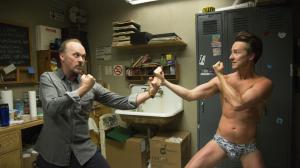 La precarietà del suo stato d’animo non migliora con l’arrivo di Mike Shiner (Edward Norton), un attore capriccioso, arrogante ma soprattutto sincero che lo pone senza remore davanti alla triste realtà della sua vita.
La precarietà del suo stato d’animo non migliora con l’arrivo di Mike Shiner (Edward Norton), un attore capriccioso, arrogante ma soprattutto sincero che lo pone senza remore davanti alla triste realtà della sua vita.
Michael Keaton ha creato un personaggio iper-loquace a tratti umoristico ma allo stesso tempo perennemente pervaso da un senso di melanconia che sfocia facilmente nella disperazione e nella rabbia.
Birdman è un film incredibilmente ricco a livello emotivo, satirico ma dolce, intimo ma diretto.
Grazie a una regia vibrante e mai troppo estrosa, Iñárritu ci trascina nella confusione che pervade Riggan senza prendere una pausa fino alla fine, che però non spiega. Forse per non guastare il realismo magico che circonda il film, per non sminuirlo d’importanza o semplicemente perché non ne vede il bisogno.
Del resto Birdman non è solo il fantasma di Riggan, così come alcuni sostengono Batman lo sia stato di Keaton; è l’alter ego di ogni uomo che viene dimenticato con il passare degli anni, il ricordo sbiadito di qualcuno che una volta è stato il migliore. Quasi come un supereroe che avesse perso i propri poteri.
